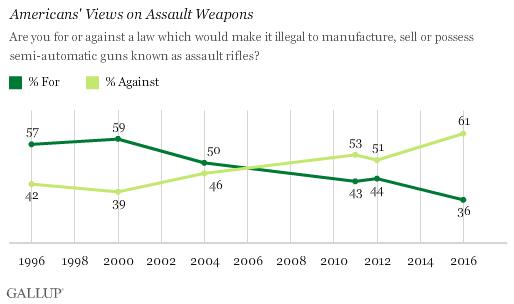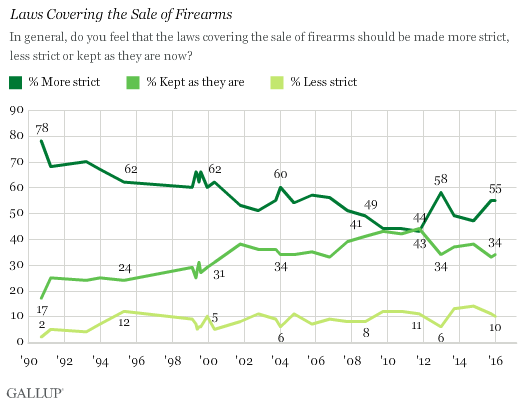The Gallup released a poll yesterday that should cast doubts in the minds of any politician proposing a new “assault weapons” ban. Barely one-third of those polled would support a law that “would make it illegal to manufacture, sell, or possess semi-automatic guns known as assault rifles.”
Support for any such “assault weapons” ban only amounted to 36% of those polled. By contrast, the number opposing such a ban comprise 61% of those polled by Gallup. This question has been asked for the last 20 years. The high point in support for such a ban was in the year 2000 when 59% of those polled supported such a law.
Support for a ban does divide along partisan lines with Republicans and independents being strongly against such a ban. Just as importantly, only 50% of Democrats support such a ban which is down from 63% as recently as year 2000.
Gun ownership does play a role in the results with those households owning firearms more likely to be against any new ban than those who don’t. Nonetheless, both groups, owners and non-owners alike, have a majority of respondents who are against a new ban.
A longer term question asked by Gallup has to do with whether the laws governing the sale of firearms should be stronger, weaker, or left as is. This question has been asked since 1990. Currently, 55% of those polled believed laws should be made stricter. This is up from 2012 when only 44% agreed that laws should be made stricter but down from a high of 78% in 1990.
This is just speculation on my part but I think if you were to run correlations of these numbers with the amount of money spent by Bloomberg’s organizations and other allied gun prohibitionist groups pushing “universal background checks” you would find a strong correlation. It does illustrate that the forces on the side of gun rights need to do a better job explaining that the “gun show loophole” (sic) is just a myth and that Bloomberg’s background checks cover a lot more than mere sales.
It should be pointed out that rights and the free exercise thereof should never be predicated on support in the polls. Public opinion is both fluid and fickle whereas rights should be solid and enduring. Polling is better reserved for determining which side is doing a better job of getting their message across than for making changes in laws.



